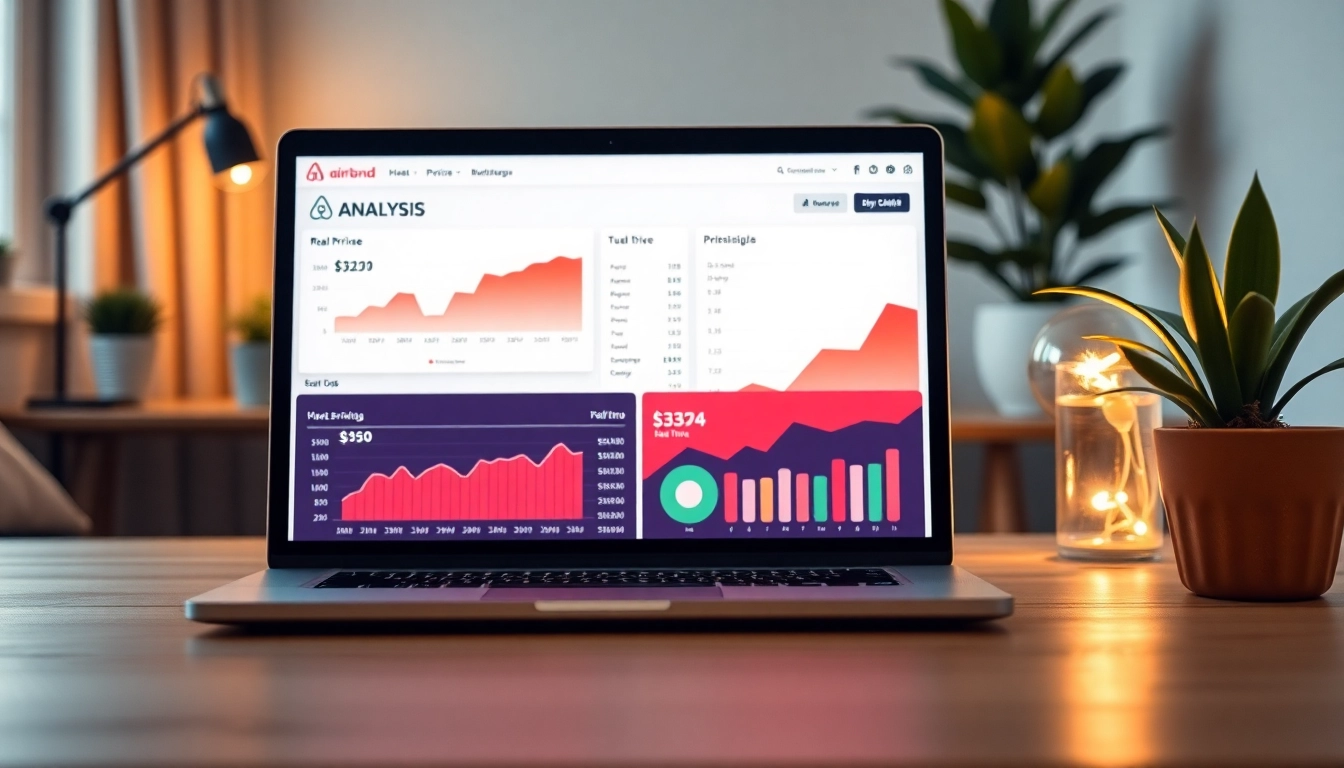Understanding Smart Airbnb Pricing
What is Smart Airbnb Pricing?
In today’s competitive lodging market, employing effective pricing strategies is crucial for maximizing profitability and maintaining occupancy rates. Smart Airbnb pricing refers to a data-driven approach that enables hosts to adjust their rental rates dynamically. Utilizing real-time data, market trends, and insights from competitor behavior, smart pricing aims to set optimal pricing that attracts guests while ensuring hosts achieve their desired revenue goals. This pricing strategy differs significantly from a static pricing model where rates are fixed regardless of external factors, which can lead to missed opportunities and lost revenue.
Why Pricing Strategies Matter
Pricing is one of the most critical aspects of success in the Airbnb market. According to several market analyses, properties that implement strategic pricing can increase their revenue by as much as 20% compared to those that do not adjust their prices. An effective pricing strategy not only attracts more bookings but also positions the listing favorably among different price tiers. It’s essential for hosts to recognize that pricing impacts a property’s visibility, perceived value, and ultimately, occupancy rate.
Components of Effective Pricing
Utilizing effective smart Airbnb pricing involves an understanding of several key components:
- Market Demand: Monitoring local demand is vital, as it fluctuates seasonally and based on events or holidays.
- Property Features: Highlighting unique features or amenities can justify higher pricing.
- Competition Analysis: Evaluating nearby listings provides insights into appropriate pricing thresholds.
- Dynamic Adjustments: Regularly reviewing and adjusting prices according to market changes ensures competitiveness.
Analyzing Market Trends for Smart Airbnb Pricing
Researching Local Market Conditions
Market conditions can vary significantly from one location to another. Engaging in thorough research regarding local trends is essential for establishing an effective pricing strategy. Hosts should consider factors such as:
- Local Events: Festivals, conferences, or tourist seasons can drive demand, thus enabling higher pricing.
- Seasonal Fluctuations: Understanding peak and off-peak seasons is key to optimizing rates.
- Regulatory Environment: Awareness of local regulations regarding rental prices can help avoid potential penalties.
Utilizing Historical Data for Insights
Historical data provides invaluable information that can inform pricing decisions. Hosts should analyze previous booking trends, occupancy rates, and guest reviews to extract useful insights. An effective way of utilizing historical data includes:
- Performance Reviews: Evaluating past occupancy rates at various price points helps identify optimal pricing strategies.
- Demand Patterns: Tracking historical demand cycles can help anticipate future trends and adjust pricing accordingly.
- Guest Feedback: Understanding what guests valued in the past can inform pricing decisions for the future.
Cultural Factors Influencing Pricing
In addition to economic factors, cultural influences play a critical role in shaping guest expectations and pricing strategies. Hosts must consider:
- Local Customs and Traditions: Certain pricing strategies may resonate more with locals or tourists depending on cultural associations.
- Value Perception: Understanding how guests perceive value in different cultures can affect pricing decisions.
- Regional Preferences: Certain amenities might command higher prices in specific cultural contexts.
Tools and Technologies for Smart Airbnb Pricing
Software Solutions for Dynamic Pricing
Incorporating technology into pricing strategies enhances decision-making and operational efficiency. Numerous software solutions offer dynamic pricing capabilities tailored for Airbnb hosts:
- Pricing Algorithms: These tools analyze various data points to suggest optimal pricing.
- Integration Capabilities: Efficient tools easily integrate with listing platforms enabling seamless updates to pricing.
- Real-Time Analytics: Access to real-time data aids in making informed pricing decisions on the fly.
Leveraging Data Analytics
Data analytics allows hosts to dive deeper into their pricing strategies. By utilizing robust data analysis tools, hosts can:
- Identify Trends: Analytics help in uncovering trends that may not be immediately obvious.
- Segment Audience: Different guest profiles might respond better to varied pricing models.
- Forecast Demand: Accurate forecasting enables proactive adjustments to pricing strategies in anticipation of market changes.
Integrating Pricing Tools with Platforms
For smart Airbnb pricing to be effective, integration with popular listing platforms is vital. This ensures that pricing changes are reflected immediately and reduces the risk of overbooking or underpricing. Key considerations include:
- API Usage: Application Programming Interfaces (APIs) can facilitate seamless integration with property management systems.
- Manual Override Features: Allowing for manual adjustments ensures flexibility when unexpected circumstances arise.
- User-Friendly Dashboards: A clear and intuitive interface allows hosts to manage pricing effortlessly.
Implementing Smart Airbnb Pricing
Creating a Pricing Strategy
Establishing a comprehensive pricing strategy is a foundational component of smart Airbnb pricing. This strategy should take into account all relevant factors analyzed previously. To create an effective pricing strategy, hosts should:
- Set Clear Objectives: Decide on revenue targets and key metrics that will be used to measure success.
- Establish Pricing Tiers: Create a range of prices based on demand fluctuations and seasons.
- Monitor Competitors: Regularly check competitors’ prices to ensure a competitive edge.
Testing and Iterating Pricing Models
After implementing a pricing strategy, the next step is to test and iterate on this model. Continuous testing allows for agile adaptations to changing market conditions. Key steps include:
- A/B Testing: Conducting experiments with different pricing models to evaluate guest response.
- Feedback Loops: Gathering guest feedback on pricing and refining strategies accordingly.
- Performance Monitoring: Analyzing key performance metrics and refining pricing strategies where needed.
Communicating Value to Guests
Effective communication of pricing value is essential in converting inquiries to bookings. Factors to consider include:
- Highlight Unique Features: Clearly express what differentiates the listing from others in the area.
- Transparent Pricing: Be upfront about pricing policies to build trust with potential guests.
- Use of Visuals: High-quality photos and descriptive narratives can justify higher pricing through enhanced perceived value.
Measuring Success of Smart Airbnb Pricing
Key Performance Indicators (KPIs)
To evaluate the effectiveness of smart Airbnb pricing, hosts should track a range of key performance indicators (KPIs). These indicators provide insight into how well the pricing strategy is performing and guide future decisions. Essential KPIs include:
- Occupancy Rate: The percentage of booked nights in relation to available nights.
- Revenue Per Available Room (RevPAR): A crucial measure for overall income generation.
- Average Daily Rate (ADR): This helps in assessing pricing effectiveness over time.
Adjusting Strategies for Optimal Results
Pricing strategies should never remain static. The ability to adjust pricing based on performance data and market conditions is key to maximizing revenue. Considerations for adjustments include:
- Seasonal Adjustments: Alter pricing based on identified peak and off-peak times.
- Market Feedback: Utilize guest feedback and booking patterns to inform price adjustments.
- Competitor Pricing Changes: Regularly adjust rates in response to competitors’ pricing strategies.
Case Studies of Successful Implementations
Examining real-world examples of successful smart Airbnb pricing can offer valuable lessons for hosts. One example involved a property owner who utilized smart pricing strategies during major local events, leading to a significant increase in revenue. The case highlighted:
- Proactive Pricing: Adjusting rates in advance of expected demand spikes maximized occupancy.
- Subscriber Engagement: Engaging guests through offers and value-added features enhanced perceived value.
- Long-Term Relationships: Developing rapport with guests led to repeat bookings, further boosting revenue.



